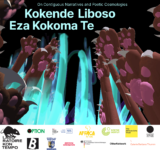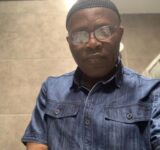Emmanuel Iduma
 Audience at Kofi Awoonor memorial at the Nairobi Museum (Photo by Paul Munene, Quaint Photography)
Audience at Kofi Awoonor memorial at the Nairobi Museum (Photo by Paul Munene, Quaint Photography)
Let’s assume from the outset that poets die because they stand in the way of politics, and let’s find a way to defend this. We’re speaking specifically about Kofi Awoonor who, on Saturday September 21, was shot dead in Nairobi by terrorists. In this regard you see that this declaration is at once literal as it is metaphorical. He was killed when he happened to be at the scene of an attack by terrorists whose politics are as bizarre as politics always is. Politics is that word you use when you want to understand how we’re governed with rhetoric and not conscience, how our lives are interrupted by others, and as in the instant case, how we may be killed.
You can’t imagine a tribute to Awoonor that has no reference to terrorism. All tributes that have poured out – all the sadness that has been shared – have been struggled with his victimization, the brutality of his encounter with death. He had said something poignant about this encounter. He seemed to have foreseen a kind of death that is not calculated, or predetermined. Death has always defied readiness; but in Awoonor’s case it loomed with precariousness. In “The Journey Beyond” he’d written:
Kutsiami the benevolent boatman;
when I come to the river shore
please ferry me across
I do not have tied in my cloth the
price of your stewardship.
Sometime in 1971, Awoonor granted a long interview at the University of Texas at Austin, which was included in the booklet Interviews with Five African Writers. His views on politics and a writer’s involvement with it will strike you as embodying the contradiction that comes with being involved, and being a bystander. If you think about his work as a diplomat in the ‘80s and early ‘90s, and if you think about his lifelong passion for education, then you add all of those to the manner of his death, you might come close to navigating this contradiction.
“The writer,” he said in that interview, “will provide not a political direction for his people, but rather a cultural direction.” And then: “Malraux is a politician but also a writer, a writer who has not confused his role as writer with his role as a politician. In short, he rose above that pure political limitation.” There you see how he framed his understanding of politics – as something that a writer ought to rise from. It was a limitation. It had a way of existing as a disturbance, a tethering, a limitation.
Awoonor wanted to escape this limitation, inspired by his understanding of what Andre Malraux had done. When he was asked why he imposed exile on himself, he said: “I felt that the demands made upon me by my basic commitment to what was going on in Ghana were so great that they did not allow me to function properly as a writer.”
He made this statement in that 1972 interview. At the end of the interview he was asked if he would return, he answered straightaway: “Oh yes…My return will not be triumphant. I shall sneak back and take my place, not because I am not happy here – that would be an understatement – but I believe I want to go into politics.” In 1975 he took a teaching position at the University College of Cape Coast. Within months of his return he was accused of helping a soldier who was trying to overthrow the Government and imprisoned without trial. He became politically active after his release; serving as ambassador to Brazil and Cuba and Ghana’s permanent representative to the United Nations.
In other words, he seemed to understand, during that interview and afterwards, that there was a middle ground he could occupy that was vague and tentative. You can see that he was searching for this vagueness elemental to the human condition, and not necessarily political. You can equally see how his involvement in politics was inevitable – a man like himself who was so aware of what power his writing could have. For him, it was politics as commitment. He had said, “I believe that the writer by the nature of his work, by the very commitment that he imposes upon himself to tell the story of our woes, sorrows and joys is a committed writer.”
Isn’t it obvious that this is not the sort of politics that killed him? This sort of politics, if you think of it expansively, will accommodate the complexities that surround the Westgate Mall attack in Nairobi. The terrorists justified their actions by pointing to Kenya’s invasion of Somalia, thereby making it clear that Awoonor’s death was a variable in an algebra of infinite justice. Kenya invades Somalia, al-Shabab invades Kenya, Somalians die, Kenyans die, and if Ghanaians happen to be in Kenya, they die as well.
Awoonor’s commitment was to “provide a little window for the rest of the world, for the rest of the community…” It was a political commitment but it was more than that. He had to stand in the way of politics – the kind of politics that killed him, the conscienceless one – in order to provide this window into the world he shared with his community. “As you write within the womb of your society, it’s not enough to answer your own individual queries or just to articulate them,” he said.
The manner of his death might seem to you like a mockery of all he had stayed committed to. You could think about how he defined his life as something representative of inter-relationships, but was in the end killed by the failure of diplomacy. But this will be a faulty way to comprehend his death. You should think of his death in line with the prophetic tone of one of his final poems, “Across a New Dawn”:
And death, when he comes
to the door with his own
inimitable calling card
shall find a homestead
resurrected with laughter and dance
and the festival of the meat
of the young lamb and the red porridge
of the new corn
*
We are the celebrants
whose fields were
overrun by rogues
and other bad men who
interrupted our dance
with obscene songs and bad gestures
You could then say that he died in mockery of the sort of politics he loathed. You could say that when the terrorists – the “bad men” – came face to face with him, he bore a commitment that was beyond himself. He was a Senior African Boy, as Teju Cole called him, and died while performing his duties as such. He had been attending a literary festival, showing once again that his world was framed by his writing and his politics was an extension of that.
You are right to think that he was more than a writer. The greatest writers always are. They embody a mystery their lives cannot unravel, a vagueness that straddles the world of writing and the world of politics. In their lifetime they can’t afford to stay aloof to the “womb” within which they exist. They might meet violent deaths because death wants to rob them of the laughter that comes with commitment to a life of selflessness. But in their writing, like in Awoonor’s, you find something outlasting death, something you can repeatedly pay tribute to.
Emmanuel Iduma was born in Nigeria and is the author of Farad, a novel. He is co-publisher of Saraba Magazine, editor of 3bute, and Director of Research & Concept Development of Invisible Borders. He is studying in New York City.





